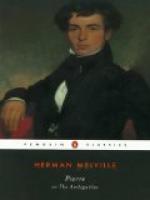|
This section contains 5,876 words (approx. 20 pages at 300 words per page) |

|
SOURCE: “That Profound Silence: The Failure of Theodicy in Pierre,” in Southern Humanities Review, Vol. XV, No. 3, Summer, 1981, pp. 243-54.
In the following essay, Gowler discusses the role of God and belief in Pierre, concluding that the novel portrays the breakdown of religious systems and “the absurdity of the human condition.”
Herman Melville's Pierre is a story of unrelieved suffering, a devolution toward despair and suicide. In it Melville appears to have vented the bitter cynicism which infected him as he tried to consolidate his identity as artist, thinker, and husband. After completing Moby-Dick, Melville began the labyrinthine psychological probings of Pierre without respite. Though on the surface Pierre seems very unlike Melville's masterwork, some scholars believe it is the culminating work in a trilogy which includes Mardi as well as Moby-Dick.1 With desperate urgency, Pierre presses the metaphysical questions introduced in these earlier works. Evil is no...
|
This section contains 5,876 words (approx. 20 pages at 300 words per page) |

|


